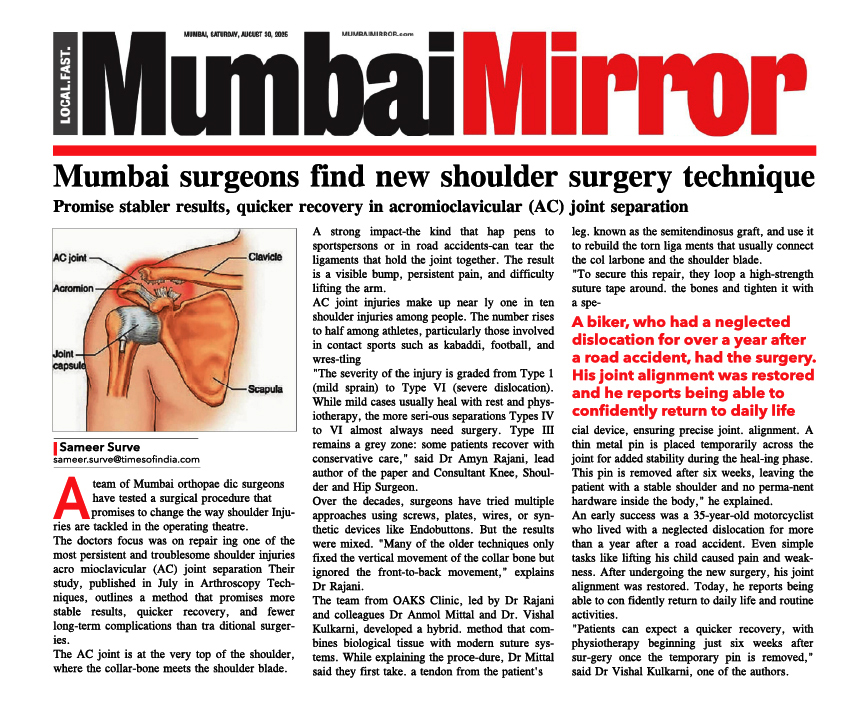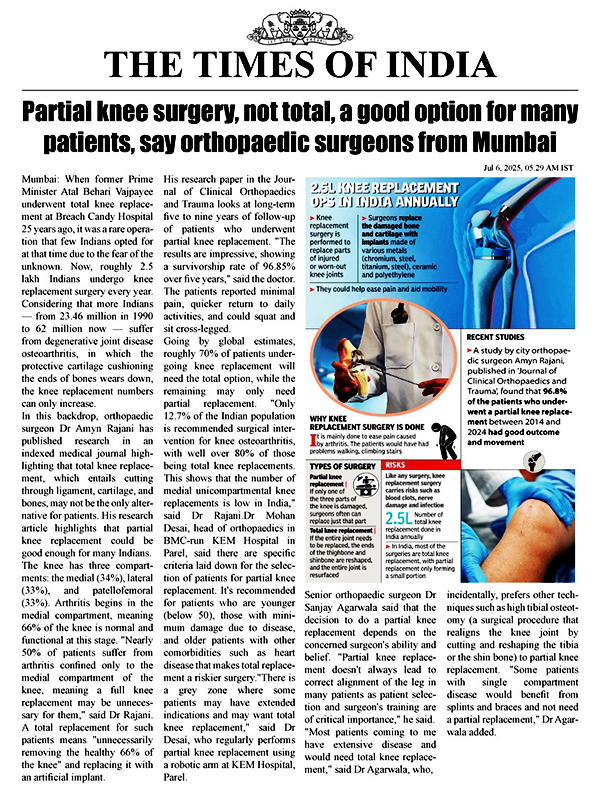The shoulder is one of the most complex and flexible joints in the human body. Its wide range of motion makes it prone to injuries and wear and tear, particularly in the subacromial space, which plays a critical role in shoulder mechanics and overall joint health. Understanding the importance of the subacromial space and its relation to injury prevention can be vital in maintaining healthy, pain-free shoulders. In this comprehensive guide, we’ll explore what the subacromial space is, why it's essential for shoulder function, common problems associated with it, and how to prevent injuries. Furthermore, we’ll discuss the importance of consulting a shoulder surgeon in Mumbai if you're dealing with persistent shoulder pain or dysfunction.
What is the Subacromial Space?
The subacromial space is the area located beneath the acromion, the bony projection on the top of your shoulder blade (scapula). This space contains crucial structures, including:
- Rotator Cuff Tendons: A group of four tendons that help stabilize the shoulder joint and enable arm movement.
- Subacromial Bursa: A fluid-filled sac that cushions the rotator cuff tendons and reduces friction during shoulder movements.
The subacromial space is vital for smooth shoulder movement. It allows the rotator cuff tendons to glide freely beneath the acromion without being pinched or compressed. However, this space is relatively narrow, and any inflammation, injury, or anatomical abnormalities can significantly reduce its size, leading to pain, impingement, or even more serious shoulder conditions.
Why is the Subacromial Space Important?
The subacromial space plays a pivotal role in maintaining the health and function of your shoulder. When functioning properly, this space allows the shoulder to perform overhead movements, such as lifting or throwing, without pain or restriction. However, if this space becomes compromised, it can result in a range of issues, including:
- Subacromial Impingement Syndrome: When the tendons of the rotator cuff or the subacromial bursa become irritated or inflamed due to excessive narrowing of the subacromial space, leading to pain, especially during overhead activities.
- Rotator Cuff Tendonitis: Inflammation of the rotator cuff tendons caused by repetitive stress, which can result in pain, weakness, and difficulty in shoulder movement.
- Bursitis: Inflammation of the subacromial bursa, causing swelling and pain in the shoulder, particularly during movement.
- Rotator Cuff Tears: Over time, repeated impingement or wear can lead to partial or complete tears in the rotator cuff tendons, requiring surgical intervention.
Given its central role in shoulder health, ensuring that the subacromial space remains unimpeded and functional is crucial for preventing injuries and maintaining shoulder mobility.
Common Causes of Subacromial Space Narrowing
Several factors can reduce the size of the subacromial space, making the shoulder more susceptible to injury:
- Age-Related Changes: Over time, the rotator cuff tendons and bursa may wear down, leading to decreased flexibility and increased risk of impingement.
- Poor Posture: Rounded shoulders, often caused by poor posture or long periods of sitting, can reduce the subacromial space and lead to shoulder impingement.
- Repetitive Overhead Movements: Athletes or individuals who frequently engage in overhead movements, such as swimmers or painters, are at higher risk of developing shoulder impingement or rotator cuff injuries.
- Bone Spurs: Bony growths on the underside of the acromion can further narrow the subacromial space, leading to increased friction and shoulder pain.
How to Prevent Subacromial Space Injuries
While the shoulder joint is prone to injury, especially in the subacromial space, there are several strategies to maintain shoulder health and prevent problems:
1. Strengthen the Rotator Cuff Muscles
Strong rotator cuff muscles provide essential support for the shoulder joint and help maintain the integrity of the subacromial space. Exercises that target the rotator cuff, such as external rotations and shoulder abductions, can improve shoulder stability and reduce the risk of injury.
2. Improve Shoulder Flexibility
Maintaining flexibility in the shoulder joint, particularly in the rotator cuff and shoulder capsule, can help reduce stiffness and impingement. Stretching exercises, such as cross-body stretches and internal/external rotations, can keep the subacromial space functional and healthy.
3. Correct Posture
Good posture is critical to maintaining a healthy subacromial space. Avoid slouching and keep your shoulders pulled back to prevent rounding of the shoulders. Exercises that strengthen the upper back muscles, such as rows or scapular retractions, can also improve posture and help prevent impingement.
4. Avoid Overhead Overuse
If your activities involve frequent overhead movements, take regular breaks and incorporate strengthening and stretching exercises into your routine to prevent repetitive stress injuries. Ensure that you use proper technique when performing overhead lifts or exercises, as poor form can contribute to shoulder strain.
5. Seek Early Intervention for Shoulder Pain
If you experience shoulder pain or discomfort, particularly during overhead movements, it’s essential to consult an orthopaedic surgeon in Mumbai as soon as possible. Early diagnosis and treatment can prevent the condition from worsening and may avoid the need for more invasive interventions.
Treatment Options for Subacromial Space-Related Injuries
When the subacromial space becomes compromised, treatment options range from conservative management to surgical intervention, depending on the severity of the condition:
- Physical Therapy: A physical therapist will guide you through exercises to strengthen the rotator cuff muscles, improve shoulder flexibility, and address posture-related issues. Physical therapy is often the first line of treatment for subacromial impingement and tendonitis.
- Anti-Inflammatory Medications: Non-steroidal anti-inflammatory drugs (NSAIDs) may be prescribed to reduce inflammation and alleviate pain.
- Corticosteroid Injections: In cases of severe bursitis or impingement, corticosteroid injections may be administered to reduce inflammation and improve shoulder mobility.
- Surgery: If conservative treatments fail to alleviate the symptoms, or if there is a significant rotator cuff tear, surgery may be required. Joint replacement surgeons in Mumbai may perform an arthroscopic procedure to remove any bone spurs or repair torn tendons, or in more severe cases, a shoulder replacement surgery might be necessary.
The Role of a Shoulder Surgeon in Diagnosis and Treatment
If you are experiencing persistent shoulder pain or dysfunction related to the subacromial space, consulting a shoulder surgeon in Mumbai is essential. A specialist will conduct a thorough physical examination, assess your range of motion, and may order imaging studies like X-rays or MRIs to identify the root cause of the issue.
When to Consider Shoulder Surgery
In cases where non-surgical treatment options, such as physical therapy or injections, have failed to resolve shoulder pain, surgical options may need to be considered. Procedures like arthroscopic subacromial decompression or rotator cuff repair can restore shoulder function and alleviate pain caused by subacromial space narrowing.
Dr. Amyn Rajani - Leading Shoulder Surgeon in Mumbai
When it comes to shoulder health and injury prevention, seeking expert medical advice from a highly experienced shoulder specialist is essential. Dr. Amyn Rajani, a renowned shoulder surgeon in Mumbai, specializes in treating shoulder conditions, including subacromial impingement, rotator cuff injuries, and more. With advanced expertise in both conservative and surgical approaches, Dr. Rajani offers personalized care and treatment options tailored to each patient’s needs. His extensive experience as a joint replacement surgeon in Mumbai ensures that patients receive world-class treatment, whether through minimally invasive surgery or total joint replacement procedures. If you're experiencing shoulder pain or dysfunction, schedule a consultation with Dr. Amyn Rajani to get expert advice on the best course of action for your shoulder health.
For more information or to book a consultation with Dr. Amyn Rajani, visit OAKS clinic at Hughes Road, Mumbai or website www.dramynrajani.com or simply call on Clinic Number 91-88989 75355 / 91-22-23619137 to take the first step towards a pain-free future.





